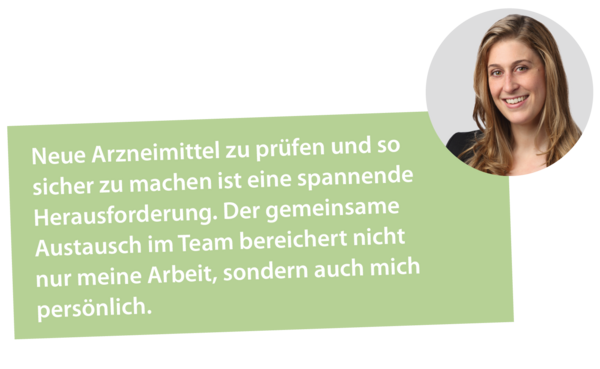


Dr. After completing her doctorate in analytical chemistry, Lisa Steinhauser initially joined a Japanese medium-sized company as a customer support manager. Further positions as Regional Sales Manager and Team Leader Food Analysis led her to her current position as Group Leader Bioanalytics at Nuvisan GmbH. Here she analyzes samples for drug development on behalf of large pharmaceutical companies.
I was interested in many subjects at school, but I found chemistry and Biology particularly exciting. I had very dedicated teachers who could explain the material well. I can no longer say exactly why I ultimately chose chemistry. I still remember that it was very easy to enroll for the diploma course at the time and I had checked the job statistics to see that the job and career prospects were good.
I had no idea what my work would look like later, but I knew there are many opportunities for chemists.
In my doctorate, I specialized in Analytical Chemistry . With the technique of liquid chromatography I separated and identified the ingredients of plants and other matrices. I started my career with a Japanese manufacturer of liquid chromatography accessories (columns). To be honest, I would have thought that I would start as a laboratory manager at a large chemical or pharmaceutical company - at least that's how I heard it at university.
In retrospect, it turned out that this entry was a real stroke of luck.
As Customer Support Manager, I was the contact person for all technical customer inquiries. In a very short time I got to know many different applications and industries. Furthermore, I supported the sales partners with training and was able to travel to customers and trade fairs together with the sales managers in Europe and the Middle East.
After another position as Regional Sales Manager, I had the chance of a management position as Team Leader Food Analysis. There I was able to develop myself further and learn what it means to be responsible for a team. When this laboratory was closed, I started my current job as Group Head Bioanalysis. My department analyzes samples for drug development on behalf of large pharmaceutical companies.
My job is to plan the various customer orders and to distribute the work optimally within the team.
Especially when a problem arises, I am the contact person for a quick decision and solution.
I coordinate appointments internally and with the customer and keep an eye on the processes in the laboratory and the progress of the projects. Many discussions are scientifically very demanding, so that we in the group make sure to carry out training and further education.
I thought it was good not to be in the lab myself anymore, because my talent is very much in organizing. Of course, there was no lecture on this at the university.
During my doctorate and in my six years of professional activity, I did further training every year on various topics,
including project management, business administration for chemists, GLP / GMP courses and personality development for managers. I consider this knowledge to be very important for my current job. I continue to attend seminars on a voluntary basis, depending on which skill I want to deepen.
We start in the morning with a ten-minute team meeting in the laboratory, in which we discuss the results from the previous day and clarify tasks and appointments for the day. Then I look through the scientific data and clarify any tests with the laboratory technicians if a method does not work. Of course, I also have some emails and phone calls to do. Together with the project managers, I write reports and communicate with the customer. I also take care of the planning of new projects.
My day-to-day work is very different than it used to be. My studies and my doctorate provided me with technical and scientific training. I think it's perfectly normal for everyday life to change.
Today my job is absolutely practical. It is no longer about basic research, but about current applications.
Our goal is to get meaningful analysis results immediately. The associated quality management is also a different approach.
I like to solve complicated questions and find answers. Some tasks in chemical analysis should work in theory, but in practice there is still a problem. Our team is then faced with the challenge of deciding which further tests to carry out under a certain time pressure. To do this, we need perseverance and a certain tolerance for frustration. In the end, however, we always manage to finish the project successfully. That makes me proud of our work.
My current professional field is part of the pharmaceutical industry. As a young professional you can start there as a project manager or laboratory manager. Depending on your own preferences, you can specialize in one area or develop your Management and leadership skills further.
I would advise you to give unusual job offers a chance as well. I tend to be one of them, for example
unknown small and medium-sized companies and start-ups.
A change of job can also help you to develop further if you feel like a new challenge after two or three years.
In addition to chemistry, you will also receive further training in other subject areas,
a basic understanding of business, IT or Management sets you apart. And trust yourself with tasks that might seem a bit too big for you at the moment.
Note: For reasons of readability, the simultaneous use of gender-specific language forms is not used. All personal names apply to all genders.
This page has been machine translated. If you have any feedback or comments please feel free to contact us. 
last modified: 10.05.2021 15:09 H from N/A